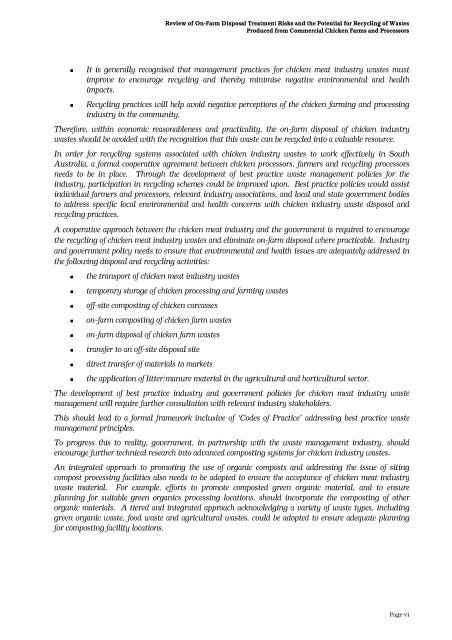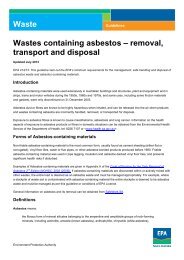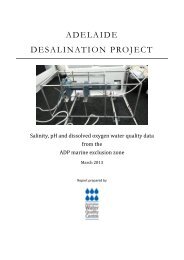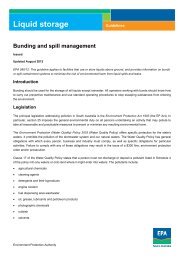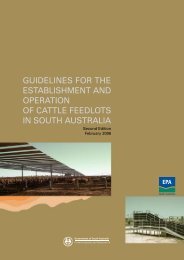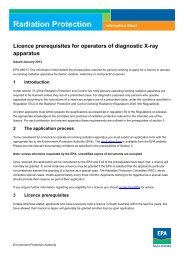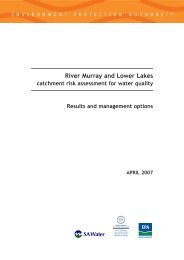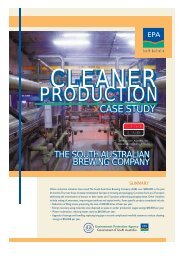Commercial Chicken Farms and Processors - EPA
Commercial Chicken Farms and Processors - EPA
Commercial Chicken Farms and Processors - EPA
Create successful ePaper yourself
Turn your PDF publications into a flip-book with our unique Google optimized e-Paper software.
Review of On-Farm Disposal Treatment Risks <strong>and</strong> the Potential for Recycling of Wastes<br />
Produced from <strong>Commercial</strong> <strong>Chicken</strong> <strong>Farms</strong> <strong>and</strong> <strong>Processors</strong><br />
¢ It is generally recognised that management practices for chicken meat industry wastes must<br />
improve to encourage recycling <strong>and</strong> thereby minimise negative environmental <strong>and</strong> health<br />
impacts.<br />
¢ Recycling practices will help avoid negative perceptions of the chicken farming <strong>and</strong> processing<br />
industry in the community.<br />
Therefore, within economic reasonableness <strong>and</strong> practicality, the on-farm disposal of chicken industry<br />
wastes should be avoided with the recognition that this waste can be recycled into a valuable resource.<br />
In order for recycling systems associated with chicken industry wastes to work effectively in South<br />
Australia, a formal cooperative agreement between chicken processors, farmers <strong>and</strong> recycling processors<br />
needs to be in place. Through the development of best practice waste management policies for the<br />
industry, participation in recycling schemes could be improved upon. Best practice policies would assist<br />
individual farmers <strong>and</strong> processors, relevant industry associations, <strong>and</strong> local <strong>and</strong> state government bodies<br />
to address specific local environmental <strong>and</strong> health concerns with chicken industry waste disposal <strong>and</strong><br />
recycling practices.<br />
A cooperative approach between the chicken meat industry <strong>and</strong> the government is required to encourage<br />
the recycling of chicken meat industry wastes <strong>and</strong> eliminate on-farm disposal where practicable. Industry<br />
<strong>and</strong> government policy needs to ensure that environmental <strong>and</strong> health issues are adequately addressed in<br />
the following disposal <strong>and</strong> recycling activities:<br />
¢ the transport of chicken meat industry wastes<br />
¢ temporary storage of chicken processing <strong>and</strong> farming wastes<br />
¢ off-site composting of chicken carcasses<br />
¢ on-farm composting of chicken farm wastes<br />
¢ on-farm disposal of chicken farm wastes<br />
¢ transfer to an off-site disposal site<br />
¢ direct transfer of materials to markets<br />
¢ the application of litter/manure material in the agricultural <strong>and</strong> horticultural sector.<br />
The development of best practice industry <strong>and</strong> government policies for chicken meat industry waste<br />
management will require further consultation with relevant industry stakeholders.<br />
This should lead to a formal framework inclusive of ‘Codes of Practice’ addressing best practice waste<br />
management principles.<br />
To progress this to reality, government, in partnership with the waste management industry, should<br />
encourage further technical research into advanced composting systems for chicken industry wastes.<br />
An integrated approach to promoting the use of organic composts <strong>and</strong> addressing the issue of siting<br />
compost processing facilities also needs to be adopted to ensure the acceptance of chicken meat industry<br />
waste material. For example, efforts to promote composted green organic material, <strong>and</strong> to ensure<br />
planning for suitable green organics processing locations, should incorporate the composting of other<br />
organic materials. A tiered <strong>and</strong> integrated approach acknowledging a variety of waste types, including<br />
green organic waste, food waste <strong>and</strong> agricultural wastes, could be adopted to ensure adequate planning<br />
for composting facility locations.<br />
Page vi


